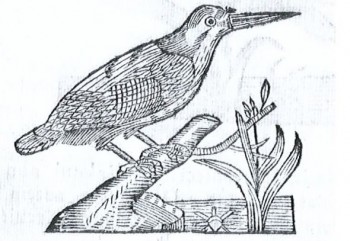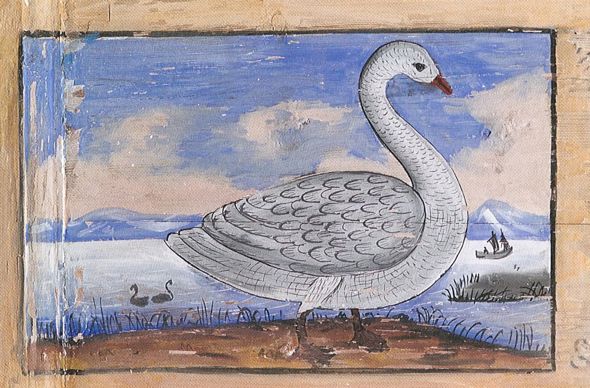Johan Leche & Johan Grysselius
The birds and the bees
2 May 2011 | Non-fiction

Halcyon or Ispida (kingfisher)? A picture of this mythical bird from a 17th-century thesis, published in Suomen lintutieteen synty

Halcyon or Ispida (kingfisher)? A picture of this mythical bird from a 17th-century thesis, published in Suomen lintutieteen synty
The famous Swedish scientist Carl von Linné claimed in his doctoral thesis in 1757 that swallows spend their winters underwater.
Two of Linné’s countrymen, working at Åbo Academy in Finland, proved him wrong seven years later by giving evidence of migration, but to no avail: the silly theory prevailed until the 19th century.
In these extracts doctors Leche and Grysselius eloquently present a ‘Well-Intended Reader’ with errors of humanity that become epidemic
Extracts from ‘An Academic Treatise on The Wintering and Migration of Swallows’ by Johan Leche & Johan Grysselius (1764), published in Finnish (translated from Latin by Sari Kivistö) in Suomen lintutieteen synty. Turun Akatemian aika (‘The birth of the Finnish ornithology. The era of the Åbo Akademi’, Faros, 2009), edited by Esa Lehikoinen, Risto Lemmetyinen, Timo Vuorisalo & Sari Kivistö
Preface
As we know, humanity is no less inclined to err in matters pertaining to nature than in matters of morals. With regards to errors concerning the natural world, even the most experienced scholars are not always immune. The common people, for their part, have not learned to avoid such pitfalls and are thus constantly bumping into them. This is no wonder, since they are not accustomed to using the help of natural science or mathematics, and are thus unable to perform appropriate tests, to correctly assess future eventualities, or to observe phenomena closely unless they concern something already familiar to them.
A disease that strikes many people simultaneously can properly be called an epidemic, and an erroneous perception that spreads among the people can be said to be much like an epidemic. Errors that grow into epidemics are tolerable as long as they do not cause any harm. If injury is added to error, however, society must destroy these misperceptions, as soon and as thoroughly as possible. I feel it is the duty of citizens of keen perception to strive to make every effort to eradicate such misconceptions….
Our own goal is to examine solely the prevailing belief that swallows spend their winters underwater. Many scholars throughout nearly all of Europe are generally of the opinion that there is neither time nor opportunity to study the matter. I am, however, quite aware that the experience of the common people is rarely to be trusted, and I have been searching for certainty regarding this claim for a long time, sparing no effort, but in vain. Although my experience in this case has shown me how difficult and indeed exasperating it is to try to destroy a belief once it has blossomed and taken root in the minds of a rough and ignorant people, I nevertheless implore You, Well-Intended Reader, to look on these innocent efforts with benevolence.
I. §.
We all know from both ancient and subsequent writings that in the whole of Europe there is no region in which the swallow does not disappear when autumn arrives. There are very different opinions, however, as to where it spends its winters. Aristotle claims that the swallows hide in mountain caves. Pechlin tells of seeing flocks of swallows in burrows found in the mountains and in the islets of the Ligurian Sea. Others say they hide in hollow oak trees in Upper Germany. Gesner claims to have seen a swallow hiding in its nest as if dead. In England, Poland, Germany, Sweden and Finland, however, the birds are believed to spend the winter underwater. In addition to swallows, there is a tradition that tells of herons who live underwater all winter, even though this is by no means probable. Aristotle and Pliny were very aware that swallows disappear when autumn comes, but neither of them mention them spending the frozen months in the water….
II. §.
I have heard from some among us an absurd story according to which a swallow spent the entire winter in a barn, and that its fellow birds would, upon their return, ostracize and mistreat it for its desertion. Everyone will of course see that there is no basis for such a claim. Although the barn may have been warm enough for a cold-susceptible bird to survive, no one can believe it could last for seven winter months without food, for during the winter not a single insect can be found in a barn. To those who would claim that the swallow slipped for those months into complete hibernation and cold dormancy like an insect and thus did not miss its food I would answer that such a small and naturally warm-blooded creature could not fail to grow numb due to the constant cold in the barn, and would inevitably perish. For this reason it is better to reject the entire story as groundless than to try in vain to find evidence from nature to support it. Surely anyone can see it as pure fabrication if they keep in mind that if such an incident should happen once by accident, then it must be possible that it should occur repeatedly, and if this were the case there would be many similar stories among the people, but there simply are not. Thus, either the whole thing is not true or the story has changed in the telling. People must have heard the story at a country party from someone who heard it from some learned person, who in turn heard it from a poet….
III. §.
Since, as I have pointed out, there are a variety of misconceptions common among the people, I viewed talk of swallows living underwater over the winter with suspicion, especially because it is such an unusual phenomenon. I suspected that it was built upon belief rather than actual observation. In addition, many rational reasons added support to my doubts of the stories’ veracity. Before making a final judgement, however, I left no stone unturned in my efforts to discover whether there existed anyone who had actually seen swallows lifted from the water in fish nets. In this way, I have had the opportunity to hear many wonderful stories.
Some claim to have seen with their own eyes as much as two tons of swallows lifted from the seabed at one time – a story that would have been more credible had the amount reported been even slightly smaller…. I have also wondered at the fact that all those who reported seeing swallows lifted from the water saw the event in childhood. Others, including some fishermen, will hesitantly admit to having often heard a similar story, yet never seen such a case themselves. I think this strange, because where there are swallows in summer, you would expect the fishermen to find them in the winter. There are also entire regions where conditions are suitable for similar claims, yet I have not heard their inhabitants speak of any such thing. Is not this hearsay, therefore, much like an epidemic, in that it rages in one parish yet circumvents the next? There are also those who came forward as witnesses and, seeing my doubt, assured me that they could prove the case by producing an example of a swallow taken from the water. But they were unable to stand behind these promises, though the matter was not forgotten, in as much as I expressed my desire to be convinced, constantly goading them with reminders, and yet they were no more able than the others to produce a single such specimen. One very venerable man promised to recount his inquiries into the question among his own people. Moments later, he wrote that he had met with a Master of Philosophy who, when asked, had assured him that he had seen swallows fished from the water, and revived when brought into a sauna, with his own eyes. So I wrote a letter to this scholar in which I eagerly explained the reasons why I was as yet unable to join in public opinion in the matter and asked him to tell me honestly what he had seen, and not simply heard, that would bear on the question. In his very first answering correspondence he confessed that he had never seen swallows fished from the water himself, but had often heard the story from reliable fishermen while working as a tutor in a seaside parish. I conclude on this basis that, much like the scholar, the fishermen commenced in this firm belief from often heard and repeated stories, and thus had no hesitation in recounting them as their own experiences.
If the swallows live in beds of reeds, as is commonly rumored, and use their beaks to burrow down to the roots, evidence for this should have been found in such places. But who can fish with nets during the winter in places where the reeds are embedded in ice at one end and the sea floor at the other? I do not consider reliable the evidence that Mr. Colas presented to the Royal Society of London of two sightings of swallows just taken from the water, reportedly so exhausted that they were scarcely able to stand, their wings drooping wet – for is it not possible that such a claim is due to an accidental error taking place at the moment of catching them? Fatigue can have many causes, and Colas himself did not see the event, but only believed the birds to have come from the water. Others who give credit to the story positively revelled in the belief that they can overturn all objections to the claim based on the supposedly invincible argument that they have seen swallows perched on a post in order to dry their soaked feathers in the sun. But is the sheen on a bird’s feathers a reason for believing them to be wet? This argument is clearly wrong, since a swallow’s feathers are known to be always shiny, and, in addition, the position of the bird affects the degree of glossiness presented to the viewer, and they are shinier when they are dry. Peacock feathers, for example, lose half their brilliancy in the presence of moisture. Such is the credulity with which idle stories are perpetuated.
IX. §.
In our own simple way we have thus striven first to release the swallows from their underwater dwelling places and other less suitable locations and demonstrate that they seek shelter for themselves with the coming of winter. Next we have studied both of their habitations and followed them on their migrations to the best of our ability. In the event that someone should assert that the use of so many arguments refuting this common belief was unnecessary, we present the following defense: we have been arm-wrestling people who stubbornly hold to such beliefs on so many occasions that our indignation has made it necessary to resort to a quantity of arguments as weapons in the arena of battle against the opposing opinion. What reason is there to prohibit scholars from displaying all their weapons, when the people’s stubbornness is such that even the sharpest spear cannot slay it.
Honour to God alone.

A mute swan? A late 17th-century wall painting, Louhisaari manor (published in Suomen lintutieteen synty)
Translated by Lola Rogers
Tags: animals, natural science
No comments for this entry yet
